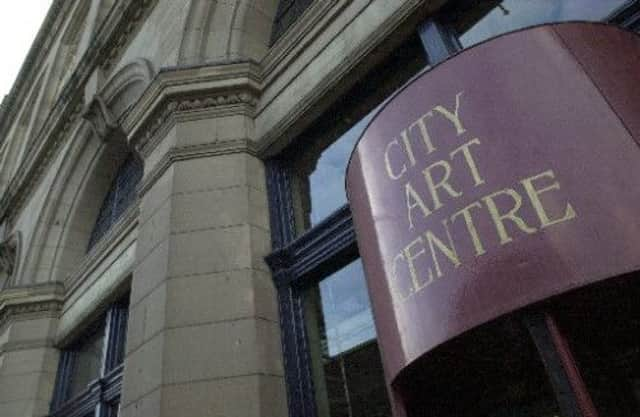Tiffany Jenkins: Guerilla opera unexpected and special


It only took the offer of a free sweet to entice us into the space, but something more substantial kept us there for the afternoon.
On entering, we noticed that people were hanging about on the ground floor of the gallery with what looked like a purpose. There were more folk than usual, even with it being a Saturday, and they were congregating; some were sitting down, others were leaning against the walls. They were clearly waiting for something. So we waited too.
Advertisement
Hide AdAdvertisement
Hide AdA soaring soprano voice then filled the large atrium. At first, despite looking around, I couldn’t see who had burst into song. There was no stage, nor was there a large lady in costume. A man was seated at a piano, but he was on his own far away in a corner. And then it became obvious. The singer was a woman standing next to the cash register, in what is a part bookshop, part ticket office, next to normal (non-singing) customers. She appeared quite average – wearing jeans, a flowery top, and a pale cardigan, a smart causal look – but she was singing, loudly, and well: “One look, and I forgot the gloom of my past”.
She started to follow a nice looking young man around the foyer. At first he ignored her, but after a while he responded in song: “If it is true, Chloris, that you love me/And I understand you love me well”.
We had stumbled on a performance of Love in a Bookshop.
Over the past couple of weeks, if you have been meandering around some semi-public space in Edinburgh, you may also have been taken aback by the glorious songs belted out by a brilliant soprano and tenor, Emma Morwood and Chris Elliott, as part of a scheme of “guerrilla opera”. These are surprise performances that are part of Edinburgh International Festivals’ year-round outreach programme.
The venues chosen for Love in a Bookshop were promoted only on social media, and required an element of detective work to find, even for those in the know. Spaces used included libraries, the Royal Botanic Garden, as well as the City Art Centre, all places where people would be, but where they would also be astonished to find that they were suddenly in the middle of a mini-opera taking place in the flower beds or behind a row of paperback books.
Love in a Bookshop is the brain child of Sally Hobson, EIF head of programme development, and purposely shown outwith the festival, in the run up to it, as a curtain raiser which doesn’t have to compete with the frenzy of all that goes on in August. The aim is to promote the work of the International Festival to a broader audience, especially to the younger ones who don’t usually shell out the required large amount of money, unless booking the necessary months in advance, for a three-hour full-on opera with intervals and curtain calls.
I am not usually a fan of outreach programmes, where arts organisations try to seduce new audiences. This is not because I think the arts should only be for an elite. It’s just that I have seen so many done badly. They tend to do the obvious and popular compositions, trying to make the music relevant, talking down to their audience as they do. There is a tendency to be defensive about whatever is being promoted, which I think can put people off, thus inadvertently reinforcing exclusion.
But this was different. One reason it was so wonderful was because of the nature of the human voice. When someone can sing, the voice is startling and beautiful. Nothing can outclass it. Also central to its success was that we were able to get very close. It was an exhilarating, intimate experience to see and hear the singers as they fell in love next to us. At one point the male lead stood so close to me that I could see his body shaking with the force of the song.
I could hear each breath he took as he declared his feelings. And I could see how the two of them looked into each other’s eyes as if no one else was there.
Advertisement
Hide AdAdvertisement
Hide AdThis particular performance was curated by threading together a love story through a series of art songs; songs which tell a story on their own, that are not part of a staged work as many arias are.
We were treated to a lovely selection of pieces from George Gershwin, Reynaldo Hahn, Robert Schumann, Roger Quilter, Gabriel Fauré, Franz Schubert, and Robert Wagner. It worked well.
As the performance began, the people watching did the usual embarrassed shuffling as the singers valiantly performed in front of everyone. Then, the mobile phones were pulled out to take pictures. But after only a few snaps the phones were swiftly put away, as if people wanted concentrate properly, to listen unencumbered.
The show was brought to a fitting end with My love is like a red, red rose by Robert Burns. With this final song a large chorus chimed in, as did most of us. It was thirty minutes long, which is just enough to demand serious attention, but leave you wanting more.
It was so good that this guerrilla opera should continue beyond the Edinburgh Festival outreach programme. The nature of the songs – that they tell a story on their own – and the nature of the staging – that you can get so close – means it deserves to be credited as something special. In other words, the performances are strong enough to be considered, not as outreach, or a snippet, but as performances in their own right. Bravo. let’s hope there is an encore.